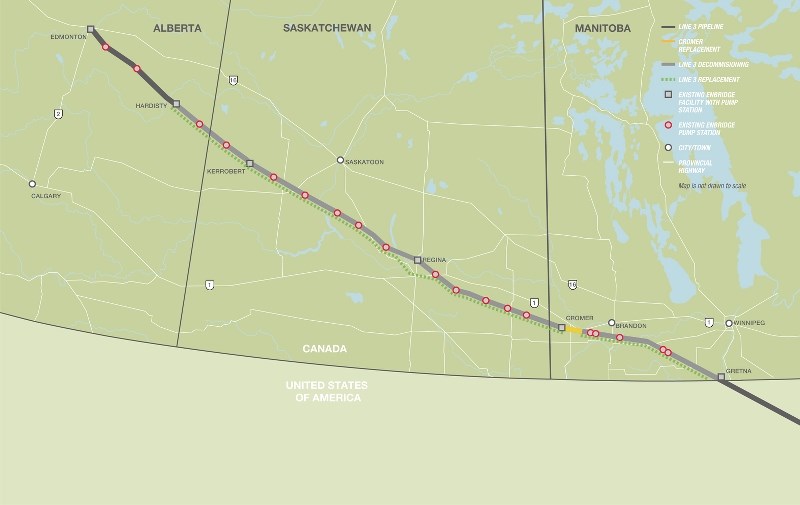Local politicians say we're finally seeing a glimmer of hope, after federal approval of two pipeline projects.
Prime Minister Justin Trudeau announced the approval of Kinder Morgan's Trans Mountain Expansion Project and Enbridge's Line 3 Replacement Project on Tuesday, Nov. 29.
Both projects are subject to a number of binding conditions, aimed to address potential Indigenous, socioeconomic and environmental impacts.
“I think it is going to enhance Alberta's ability. I am just ecstatic for this particular area because we are heavily dependant on getting our oil to market,” said Bonnyville Mayor Gene Sobolewski. “It means a little more stability to the market in the ability to move our product, and what that means is that hopefully we won't see as much swing in the variability in the open market.”
Bonnyville-Cold Lake MLA Scott Cyr added the approval of these projects means oil will be moving out of the Lakeland, something the area is in desperate need of.
“We needed to increase the capacity out of the province, and this will do that.”
However, Lakeland MP Shannon Stubbs cautioned against getting too optimistic too soon.
“While I welcome the approval of both the Trans Mountain and Line 3 expansion projects, there's still no indication when, or if, these pipelines will actually get done,” said Stubbs. “There is still a long road ahead for Canada.”
Some of the bigger news, Sobolewski said, is the ratification of an Organization of the Petroleum Exporting Countries (OPEC) agreement to reduce output from outlying nations.
“I am relieved that globally and nationally we are seeing some light at the end of the tunnel to be able to move our product, and hopefully with the stability of oil prices, we will see continuing development which will continue to assist the Town of Bonnyville to help us maintain or economic growth and prosperity.”
Built in 1953, the Trans Mountain Pipeline stretched 1,150-kilometres from Strathcona County, AB to Burnaby, BC.
On Dec. 16, 2013, Trans Mountain applied for a $6.8 billion expansion.
The project includes the addition of 980-kilometres of new pipeline, the reactivation of 193-kilometres of pipeline, and the addition of 20 new tanks to existing storage terminals in BC and Edmonton.
The new pipeline will be used to carry heavier oils, with the potential of carrying lighter crude oils. The old pipeline will transport refined products such as synthetic oils.
Construction for the Trans Mountain could begin as early as fall 2017.
The Line 3 Replacement project will see the replacement of 1,660-kilometres of existing pipeline using modern pipe materials, spanning from Hardisty, AB to Gretna, MB.
This project is projected to cost $4.8 billion, and will generate over $514 million in revenues for the federal and provincial governments. Over 7,000 new jobs could be created during the construction period, and could be in service as early as 2019.
Wildrose Leader Brian Jean said the approval of the two projects is nothing but good news for the province.
“Pipelines in all directions create jobs and improve the long-term prosperity of our province,” he said. “However, we need pipelines built, not just approved.”
Stubbs said in order to ensure these projects move forward, the federal government needs to “champion these critical infrastructure projects, and work with proponents to ensure the conditions aren't permanent roadblocks.”
At the time of the announcement, an embargo on crude and persistent oil tankers along BC's north coast was also declared, and the National Energy Board was directed to dismiss the Northern Gateway Pipeline application.
There are 31 Indigenous communities with their hands in the pot for the Northern Gateway project, through the Aboriginal Equity Partners (AEP). These communities are financially committed to the project.
Stubbs acknowledged the hard work that has been done over the years in a media statement, stating the government's decision has “closed the door on billions of dollars and years of hard work.”
“On Northern Gateway, the pipeline would actually diversify Canada's customers by getting Canadian energy to tidewater and then to Asian markets,” added Stubbs.
“I am disappointed that the Gateway project wasn't approved,” Sobolewski said, adding he can understand some of the rational, “but I am not happy with some of the political interference.”
Stubbs continued that the moratorium banning oil tanker traffic was made with “no consultation or economic impact assessment, and no analysis of safety or environmental standards and gaps.”
“It's time for the Liberals to stop playing politics with Canada's energy future.”
While there may be a long road ahead, many local and provincial politicians alike agree it's a step in the right direction.
“Our province has been brutally slammed by the collapse in commodity price,” Premier Rachel Notley said in a release. “It's been a long dark night for the people of Alberta as a result. Today we are finally seeing some morning light.”



